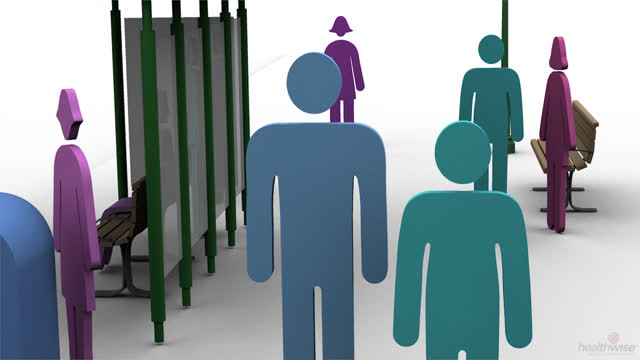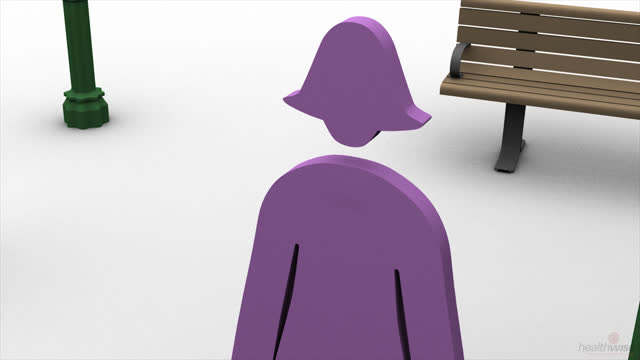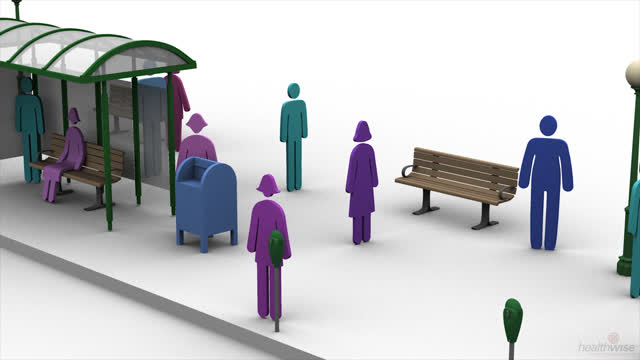Top of the pageActionset
Depression: Helping Someone Get Treatment
Introduction
Your loved one or friend doesn’t seem the same. You thought it was the blues, but it’s been going on for weeks. And it seems much worse than that.
Is your friend grieving over something? Or could it be depression?
If you want to learn more about grieving, see the topic Grief and Grieving. If you think someone close to you is depressed, urge him or her to see a doctor.
This topic will give you the tools to do so.
- Depression is a disease. It’s not being lazy, and you can’t “just get over it.”
- Depression is very common and is nothing to be embarrassed about.
- The best thing you can do for someone who has depression is to help him or her get treatment.
- Don’t ignore talk about suicide. Talk to a doctor, or call 911 or emergency help if needed.
- Treatment works, and there are many choices in treatment. Many types of health practitioners can treat depression.
- Depression can be caused by another medical problem. Treating the problem may stop the depression.
How can you help?
If you’re worried about a loved one or a friend, you probably want to talk to him or her about your concerns. Here are some things you can do:
Tell the person about depression and why you are concerned
- Stress that depression is not laziness or something in the head. It’s a common disease and is nothing to be embarrassed about.
- Point out the symptoms of depression that you have noticed in your family member or friend, and say why these symptoms worry you. Use a supportive and caring tone of voice while you are doing this.
- Ask the person to answer a few questions to see if he or she might be depressed.
Explain why the person needs to see a health professional
- Explain that very few people get over depression on their own. Most people need some type of treatment. The sooner someone gets treatment, the sooner he or she will feel better.
- Point out that there are many types of professionals who treat depression and many types of treatment. Just because a person is depressed doesn’t mean that he or she needs to see a psychologist or take medicine. A family doctor or a counselor may be able to help.
- Point out that depression might be caused by another problem. For example, many people have an underactive thyroid, which can cause symptoms of depression. A doctor can diagnose this and give the person thyroid medicine. This will stop the depression. A doctor also can tell if a medicine, such as one used for high blood pressure, might be causing depression.
Watch for the warning signs of suicide
- Watch for the warning signs of suicide, such as talking a lot about death or giving things away and writing a will. If you notice them, call the doctor.
- Call 911 or emergency help if you think:
- The person is going to harm himself or herself or others. For example, the person has a written plan or a weapon or is saving (stockpiling) medicines.
- The person is hearing or seeing things that aren’t real.
- The person seems to be thinking or speaking in a bizarre way that is not like his or her usual behavior.
Help the person overcome fears about treatment
Many people have reasons why they don’t want to see a doctor. Talk about these barriers, and help the person find solutions.
|
Barrier |
Solution |
|---|---|
|
“See a shrink? I’m not crazy.” “People will think I’m weak.” “What will my family and friends think?” |
|
|
“It might hurt my career.” |
|
|
“I’ve had counseling before and didn’t like it.” |
|
|
“Aren’t medicines for depression addictive?” “These medicines make you crazy or uninterested in sex.” |
|
|
“Someone might get into my medical records and see this.” |
|
|
“It’s hard to schedule and find time for an appointment.” “I can’t get there.” |
|
|
“I’ve tried to talk to people. They just don’t get it and don’t care.” |
|
|
“I can’t afford it.” |
|
Credits
Current as of: May 28, 2019
Author: Healthwise Staff
Medical Review:Kathleen Romito, MD – Family Medicine & Lisa S. Weinstock, MD – Psychiatry
Current as of: May 28, 2019
Author: Healthwise Staff
Medical Review:Kathleen Romito, MD – Family Medicine & Lisa S. Weinstock, MD – Psychiatry
This information does not replace the advice of a doctor. Healthwise, Incorporated, disclaims any warranty or liability for your use of this information. Your use of this information means that you agree to the Terms of Use. Learn how we develop our content.






